|
|
|
Sort Order |
|
|
|
Items / Page
|
|
|
|
|
|
|
| Srl | Item |
| 1 |
ID:
129841
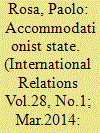

|
|
|
|
|
| Publication |
2014.
|
| Summary/Abstract |
This article aims to highlight the impact of strategic culture on Italian attitude to war and peace. The first section shows how both structural interpretations based on the influence of international variables and domestic models that neglect the cultural dimension offer no adequate explanations of Italy's military behaviour. The second section reviews the literature on strategic culture and its usefulness to explain the Italian case. The third section examines the characteristics of Italy's strategic culture through the period of the Republic, and the fourth examines the influence of ideational factors on its military behaviour abroad. In this section, a series of hypotheses derived from structural and cultural models are tested using data from the Correlates of War dataset. The conclusion provides a summary of the research findings that emerged from the empirical analysis.
|
|
|
|
|
|
|
|
|
|
|
|
|
|
|
|
| 2 |
ID:
151631
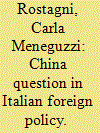

|
|
|
|
|
| Summary/Abstract |
Relying on evidence from the Italian Ministry of Foreign Affairs and on the private archives of both Aldo Moro and Pietro Nenni, this article shows that from the mid-1950s onwards, important politicians—Socialist Pietro Nenni, Christian Democrat Giovanni Gronchi and Liberal Gaetano Martino—worked to encourage economic exchanges between Italy and China, and were linked with the concurrent initiatives of economic actors like Dino Gentili and Enrico Mattei. It also reveals that this gradual but steady process placed the China question firmly on the agenda of Italian parliamentary debates and government programmes as early as 1964. Finally, it shows that, while American diplomacy was still dominated by the Vietnam War and opposed any initiative towards Chinese recognition, in 1969–1970 the long process of rapprochement between Rome and Beijing came to an end. Thanks to Nenni's and Moro's diplomatic action, Italy recognized the People's Republic of China (PRC) before the Americans decided to inaugurate triangular diplomacy and reach out to China.
|
|
|
|
|
|
|
|
|
|
|
|
|
|
|
|
| 3 |
ID:
151525
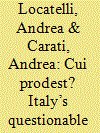

|
|
|
|
|
| Summary/Abstract |
Since the end of the Cold War, Italy has taken part in several multilateral military operations. Many, if not all of them, have implied significant political and human costs for the country. Indeed, the very same contribution to multinational missions in terms of troops deployed bears witness of the importance the country attaches to multilateral missions. In particular, Italy displayed considerable commitment to R2P-inspired interventions. The aim of the paper is then to investigate on the deep causes that drive such an apparently value-oriented foreign policy course. In doing so, it firstly analyses the Italian contribution to multilateral missions. Secondly, the paper discusses which factors can explain such behaviour: international norms, economic and/or security interests, and followership. The paper presents a preliminary test of the drivers of the Italian engagement in multilateral military operations. In this view, it investigates empirically the public debate on Italian participation to relevant R2P-like operations like Kosovo and Libya.
|
|
|
|
|
|
|
|
|
|
|
|
|
|
|
|
| 4 |
ID:
144732
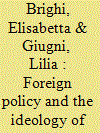

|
|
|
|
|
| Summary/Abstract |
The post-communist Italian Left has experienced a long phase of ideational misalignment between ideas placed at different levels, as a qualified discursive institutionalist approach demonstrates. Background public philosophies have often clashed with post-communist political ideology, while foreign policy programmes have often contradicted specific policies. Under the leadership of Matteo Renzi, however, the PD is now experiencing a moment of remarkable ideational consistency. Rather than being founded on entirely new premises, this new consensus folds old elements into new ones and shows all the defining traits of post-ideology. Yet, by espousing post-ideology, Renzi is making an ultimately ideological move whose limitations may soon start to show.
|
|
|
|
|
|
|
|
|
|
|
|
|
|
|
|
| 5 |
ID:
094597
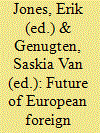

|
|
|
|
|
| Publication |
London, Routledge, 2009.
|
| Description |
199p.
|
| Standard Number |
9780415478717
|
|
|
|
|
|
|
|
|
|
|
|
Copies: C:1/I:0,R:0,Q:0
Circulation
| Accession# | Call# | Current Location | Status | Policy | Location |
| 054852 | 327.4/JON 054852 | Main | On Shelf | General | |
|
|
|
|
| 6 |
ID:
108661
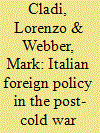

|
|
|
|
|
| Publication |
2011.
|
| Summary/Abstract |
Drawing on a neoclassical realist approach, this article analyses the foreign policy conduct of different Italian governments from 1994 to 2008. Pressured by the post-cold war international system, these governments have been compelled to raise Italy's profile within the international system. However, the way in which successive governments have responded has differed markedly. By looking at variables located at the domestic level - elite perceptions of the distribution of power and government instability - it is possible to explain these differences. Neo-classical realism is seen as an advance on Waltzian neo-realism precisely because it allows room for domestic as well as international (or systemic) variables, and because it has a very specific focus on foreign policy as such.
|
|
|
|
|
|
|
|
|
|
|
|
|
|
|
|
| 7 |
ID:
142879
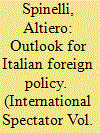

|
|
|
|
|
| Summary/Abstract |
No reasonable person can claim that Italy plays an original and exemplary role in international affairs, even if it is not infrequent for statesmen and writers from our country to take seriously the most trite commonplaces of Risorgimento-style rhetoric and to give Italy just this task. The cultural, political, economic and military weight of the country is not such as to permit us to take a very different path from those of the countries with which we are in close contact. From the birth of the Italian state until today the basic decisions of its foreign policy have substantially conformed with the major trends at work in this or that period. But since such trends have not and never have had exactly the same implications and consequences, it has always – and it is possible to insert here, acting reasonably or unreasonably, near-sightedly or far-sightedly, constructively or destructively – contributed thus to the strengthening or weakening of the trend in which it operates. In judging the past policies of Italy and in speaking of future prospects, we must not, therefore, judge as wise or unwise those who made the basic decision as much as the manner in which, the choice once made, they have then acted within its scope.
|
|
|
|
|
|
|
|
|
|
|
|
|
|
|
|
| 8 |
ID:
127825
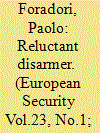

|
|
|
|
|
| Publication |
2014.
|
| Summary/Abstract |
Of the five North Atlantic Treaty Organization (NATO) European countries of US nuclear forward deployment, Italy is the least-known and studied case, even though the country hosts the largest number of US nonstrategic nuclear weapons (NSNWs) and still has two bases of deployment. The paper aims at filling this gap by analyzing Italy's current view on the presence, value, and future of NSNWs hosted on its territory. The analysis begins with the examination of the process of profound devaluation that has minimized, starting from the end of the cold war, Italy's original interest in this category of weapons. It then examines the reasons why Rome continues to pursue conservative nuclear weapon policies and distances itself significantly from the progressive camp of NATO members, particularly Germany, that explicitly call for the withdrawal of US NSNWs from Europe. Through the study of the Italian domestic politics and security culture, the article explains Italy's opposition to any radical change in the NATO nuclear status quo, and its reluctance to pursue policies that are consistent with the process of nuclear devaluation that the country has experienced over the past two decades.
|
|
|
|
|
|
|
|
|
|
|
|
|
|
|
|
| 9 |
ID:
144731
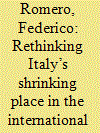

|
|
|
|
|
| Summary/Abstract |
Italy’s foreign policy is still shackled by two features inherited from its modern history: an obsessive focus on rank and prestige, and a no less delusional faith in the redemptive character of the EU and other multilateral arrangements it belongs to. The ‘middle power’ foreign policy model elaborated in the 1980s had a rationale of its own but it can hardly be adapted to the globalised world, nor can it be sustained by a deteriorated economic and societal domestic fabric. Italy has to rethink its basic national interests, adapt its foreign policy tools to new concepts of relevance and influence, and focus on a long-term, concerted effort at domestic regeneration if it is to withstand the challenges of the globalised world we live in.
|
|
|
|
|
|
|
|
|
|
|
|
|
|
|
|
| 10 |
ID:
176544
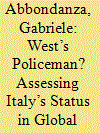

|
|
|
|
|
| Summary/Abstract |
Since the 1960s, and especially the 1980s, Italy has participated in and led numerous peace support operations (PSOs), predominantly under the aegis of international organisations. Italy’s participation in PSOs authorised by the UN, the EU, NATO and other multilateral agreements stems from a combination of national interest and humanitarianism/multilateralism. However, although acknowledged as a significant contributor, a clear assessment of its status in global peacekeeping is still missing. In fact, Italy plays a role that is comparatively greater than all Western nations in the international fora taken into account, and, as such, can be described as ‘the West’s policeman’, from both a quantitative (number of troops) and qualitative (role within the missions) perspective. This might be somewhat curbed in the future, however, due to some of the country’s limitations on foreign policy.
|
|
|
|
|
|
|
|
|
|
|
|
|
|
|
|
|
|
|
|
|